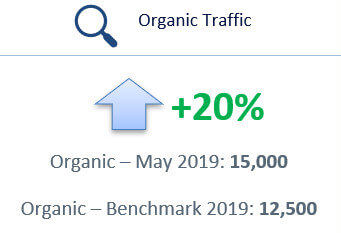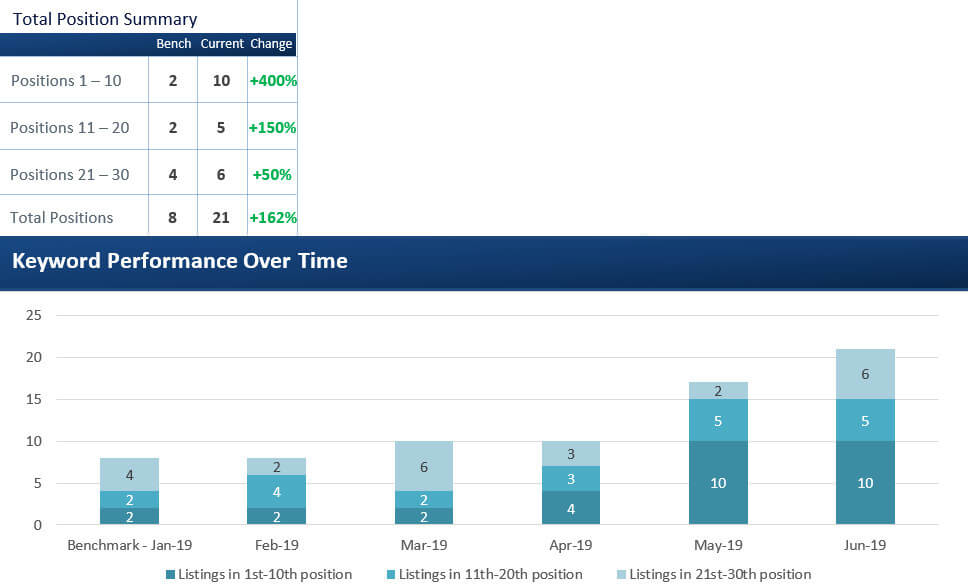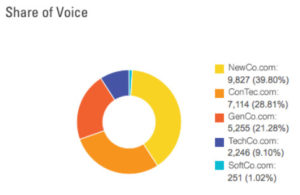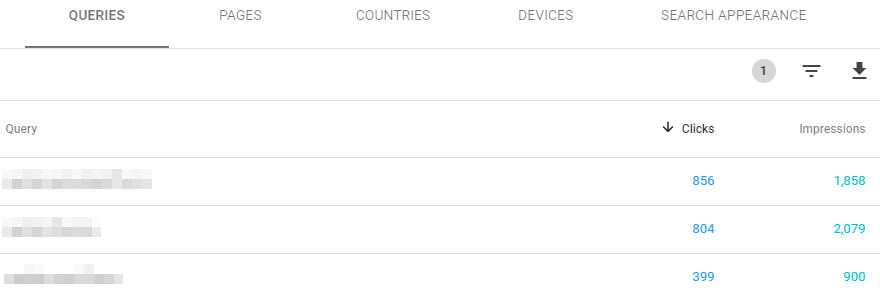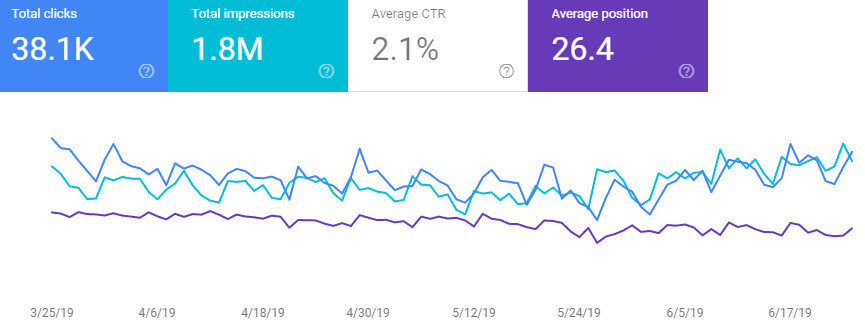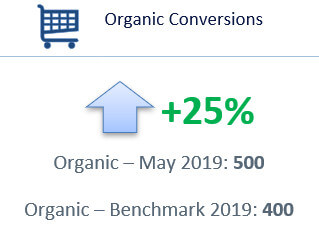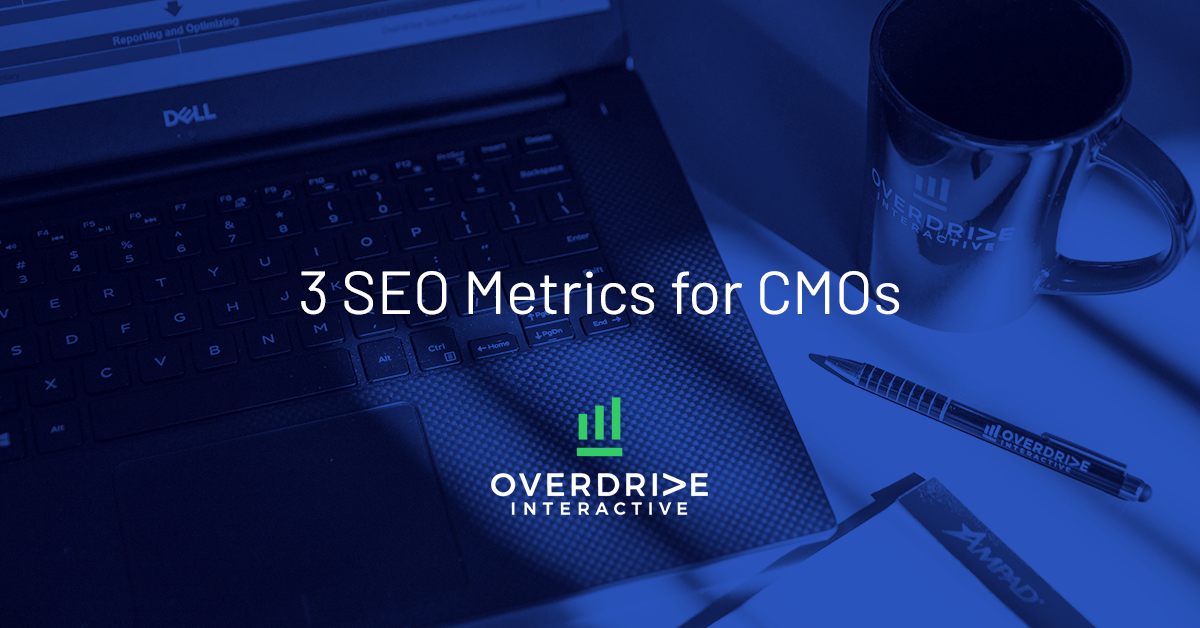
Effective SEO management and reporting should provide quick access to key performance metrics while delivering the flexibility to tailor results to your needs. SEO metrics should provide valuable, fast answers and clear stories around your marketing questions as they relate to search engine optimization.
Comprehensive SEO Metrics to Track
How can we arm our CMOs with the data, key performance indicators (KPIs), and results they need to be prepared for meetings and to ensure the sustainability of an SEO program?
Marketers and SEO management practitioners must work with other individuals in all sorts of job roles – executives, tech staff, content specialists, and many more – to answer and address questions such as:
- Have you established SEO metrics and KPIs? And have you improved over time?
- Is your tracking, measurement, and reporting in place?
- How will you measure success?
- What is the site’s monetization strategy?
- Have you set realistic expectations for timelines of success? For example, improving organic conversions by 50% year over year.
1. Organic Traffic
Organic visits are the most basic, yet arguably most important, SEO metric. With positive results from an SEO solution, you’ll see dramatic increases in quality web traffic and relevant customer experiences that build the brand and drive revenue.
The most popular method of tracking organic traffic is with Google Analytics (GA). GA defines a visit as a session, which is the period of time a user is active on the site. When organic traffic increases, generally this is due to successful optimization, and when it decreases, this suggests there may be an issue to address.
Compare organic traffic month over month. Are you up or down? If you’re down it could be seasonality. Or, something could be wrong and needs to be diagnosed. Which pages suffered the biggest drops?
Compare the same month year over year – is May 2019 higher than May 2018? What SEO-centric changes have you made in the last 12 months that could have contributed to traffic growth? If visits are lower than they were last year, you may not be making the right types of optimization.
Mobile Traffic
Zero in on visits by mobile device type. Is mobile traffic growing and desktop declining? Do your pages have a responsive web design? What are the load times?
People are spending more and more time on their mobile devices and tablets, yet many websites still are not designed to account for different screen sizes and load times. Optimize your site design, structure, and speed to ensure you’re not turning visitors – and potential customers – away.
Drive, Capture, Convert, Optimize
To help marketers and CMOs see the big picture, consider the concept of “Drive, Capture, Convert, Optimize” (or DCCO), which illustrates the entire conversion path from impression to sale. In the Drive stage of DCCO, marketers drive traffic to a company website. Search engine optimization can be a powerful traffic driver, but as with other DCCO components, strategy and execution are key.
Landing Page Engagement & Conversion Rate
When it comes to better visibility and findability, it’s imperative to analyze your website performance at the landing page level. Better and richer data sets are infused with behavior insights.
Here are SEO metrics for traffic that can be found in Google Analytics reporting:
- Sessions
- Users
- New Users
- Bounce rate
- Pages/session
- Avg. Session Duration
Is a landing page garnering lots of traffic but has a high bounce rate? This could suggest users aren’t finding what they’re looking for. Does a landing page have a strong pages/session (e.g. two or three pages in a session) but no associated conversions? This could suggest users are exploring, which is great, but ultimately aren’t engaging with your site. A prescriptive SEO solution is needed to improve the customer experience and conversion rate.
2. Keyword Rankings
Keyword ranking is the position of a website in a search result. Higher rankings are important as users typically only click those web sites that appear in the first few positions. Ranking is influenced by a host of factors including inbound links, domain authority, as well as on-page factors like breadth and depth of content, keyword usage, titles and meta tags, contextual relevance, and semantic meaning.
Are rankings for your tracked keywords improving on the first page of Google? What about the top 30 positions? If your business has a storefront, are you improving your universal presence – rankings for local 3-pack listings, knowledge panel, images, etc.?
Tracking the rankings of your keywords helps you understand if your SEO efforts are working, and there are many tools to measure the performance of your brand and product/service awareness.
Competitive Comparison
Naturally you want to see how you fare in organic search in comparison to your competitors. Aside from simply counting total ranked keywords, share of voice is a great SEO metric with more value.
Keyword share of voice shows how your domain is performing compared to competitors (or other top domains you might not realize are eating your lunch) for a keyword or keyword group. This metric is typically calculated by the weighted rank position for each of the ranked keywords and the search volume for each. You may rank for 15 keywords while one of your competitors ranks for 10, but their share of voice could be larger if they out-rank you for high-volume keywords.
Ranking & Volume SEO Tools
BrightEdge
The enterprise SEO platform, BrightEdge, understands the keywords that drive organic traffic to your site. Their reporting is the most comprehensive knowledge center of SEO metrics and keyword performance. Start tracking your product, solution, and brand keywords in the platform to prioritize your efforts by gleaning the rich data sets that include search volume, ranking position, universal results, and more.
Moz/Ahrefs/SEMrush
These are common tools for the modest SEO company to monitor your keyword rankings and visibility. Track how your efforts are paying off with tables and interactive graphs and compare your performance against the competition. See where organic search traffic is landing on your website, report on average ranking position and traffic, and segment the distribution of positions in search results.
Google Ads Keyword Planner
Keyword Planner is a free Google Ads tool that’s like a workshop for building new ad campaigns, but it’s also the best place to go for estimated Google search volume (or, how many times a given query is searched per month) to determine popularity and competitiveness. You can use this SEO keyword tool to get keyword ideas, search volume for countries of your choosing, and other historical SEO metrics for your keywords.
Google Search Console
Is there a place to find the exact queries that users are searching on to find your site? Yes! The best source is Google Search Console (GSC), formerly known as Google Webmaster Tools.
GSC serves as a portal for a host of tools for developers and SEO companies to improve their property’s Google search rankings. Search query reporting can be found in the Performance section, which breaks down search data and can be filtered in many ways for a more precise means of analysis. Uncover important SEO metrics about how your site performs in search results:
- How often your site appears for search queries
- Average position in search results
- Click-through rate
- Special features (such as rich results) associated with your site
Marketers can leverage this information to improve search performance and even develop a content action plan for the CMO. See how organic traffic changes over time, where traffic is coming from, and the search queries that are most likely to return your site in the SERP. See which pages have the highest and lowest click-through rates, and then use this data to adjust your optimization strategies.
3. Conversions & Goals
Now that you’ve got traffic and rankings in the bag, measuring the quality of visitors via conversions is the next SEO metric to covet. Common examples of conversion types include:
- Contact form completions
- Asset downloads
- Newsletter subscriptions
- Purchases
- Marketing-qualified leads (MQLs)
- Sales-qualified leads (SQLs)
Tracking these involves a little bit of extra work, setting up goals and/or events in your platform of choice.
Look at a 13-month period to see the past year’s trend and the year-over-year comparison (May 2019 versus May 2018) – are there more conversions than a year ago? Are calls to action generally above the fold and easy to see throughout the site? Are there times of the year where specific conversion types are higher or lower than expected? Have any SEO-centric changes like tracking or messaging been made to calls to action?
Other Ways to Measure Impact
CMOs are looking for new ways to measure the impact of their investments, and there are other engagements that open the door to a new world of measurement possibilities. These often-overlooked SEO metrics also have far more immediacy that can be measured and reported:
- Video views
- Page views per visit
- Phone calls
- Return visits
- Comments and user reviews
Example SEO Dashboard for CMOs
For a robust look at the SEO elements that CMOs should be keeping an eye on, a dashboard with a storytelling mindset is needed to showcase your SEO program’s results in a manner that commands high-level interest.
Here’s an example of the ultimate SEO dashboard for CMOs. Cut through the noise and get to what CMOs really care about!
Need Help Leveraging SEO Metrics?
Search engine optimization is a discipline that involves many different tasks and a broad variety of SEO skills and experience that no single person or department can provide. But with defined SEO metrics, we can arm our CMOs with the KPIs they need.
Contact us today or call our Boston office at 617-254-5000 to set up an SEO capabilities presentation for your CMO. We’ll show real life SEO metric examples of how our tactics have resulted in success.




